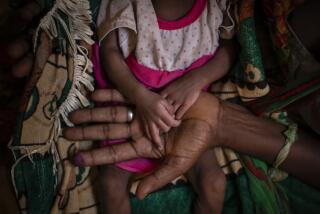TV REVIEW : Self-Help Message in 3rd World Documentary
- Share via
What’s your reaction to Third World starvation and disease? Have you grown numb to endless images of pitiful living skeletons? Do you see financial aid as money down the drain?
What if you knew that there are forces within each country engaged in a monumental effort to improve the plight of their own people? Intelligent, determined forces--teen-agers, adults, parents, politicians, health care workers, teachers--with familiar concerns about the quality of life, about the future.
You might feel differently about offering a hand up, not a hand-out.
That’s one of the strong messages in “A Chance to Live,” a blunt, two-part PBS documentary that begins Sunday at 9 p.m. on KCET Channel 28 with “Why Save the Children?” It chronicles a massive campaign carried out by UNICEF, the Task Force for Child Survival, the World Health Organization and the Save the Children Fund to immunize the developing world’s children against killer diseases. The first hour begins with a self-congratulatory tone, but understandably: By the 1990 target date, 80% of the children in 100 countries had been vaccinated. In the face of political, cultural and social differences, it was a stunning feat.
It’s those differences that fascinate: In Yemen, men haggle over whose cars to use to transport the vaccine and decide to use women as nurses for the first time. In Brazil, music videos air to encourage parents to have children inoculated. In India, film stars make public-service spots.
Still, it’s “Who Pays for Africa?,” airing Sept. 22, that packs the real wallop. As the immunization plan goes forward, Africa is seen fighting to provide permanent health care. Here are the pictures of emaciation and misery, a deliberate backdrop to the acknowledgement of “donor fatigue,” of First World “boredom” with Third World crises, of the criticism that overpopulation is due to irresponsibility, that Africa is a “bottomless pit” of need.
Here too are Nigerians and Ugandans, working against all odds to change social conditioning against family planning and contraception, to establish health services and health education.
There’s a lot of plain speaking--why not let children die, if overpopulation is a burden?--and the international medical community’s reluctance to practice preventive medicine is noted. To the question, “How do we get people to give a damn?,” one official answers that it’s in our own self-interest “to create a healthy environment . . . or you’re going to find crime, economical despondency and all the things that make this a planet in which nobody wants to live.”
More to Read
The complete guide to home viewing
Get Screen Gab for everything about the TV shows and streaming movies everyone’s talking about.
You may occasionally receive promotional content from the Los Angeles Times.






